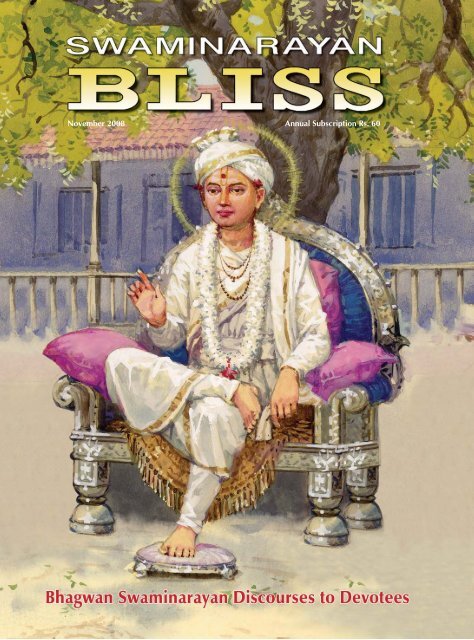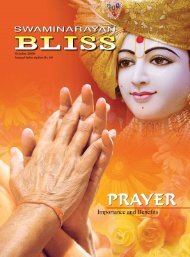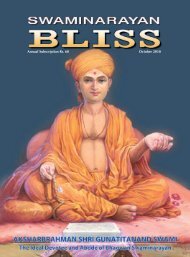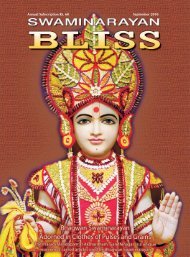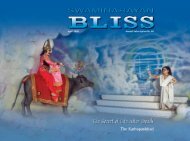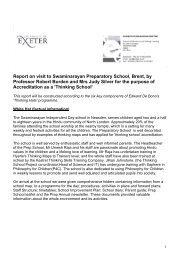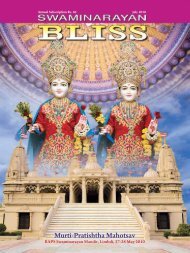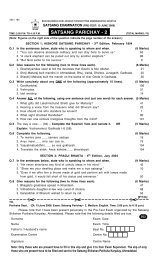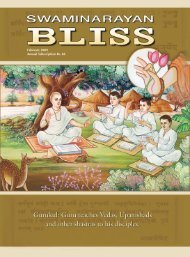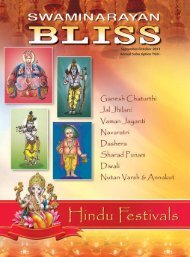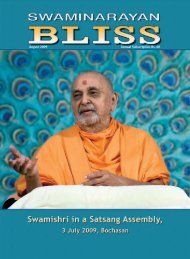November 2008 Annual Subscription Rs. 60 - Swaminarayan Sanstha
November 2008 Annual Subscription Rs. 60 - Swaminarayan Sanstha
November 2008 Annual Subscription Rs. 60 - Swaminarayan Sanstha
You also want an ePaper? Increase the reach of your titles
YUMPU automatically turns print PDFs into web optimized ePapers that Google loves.
<strong>November</strong> <strong>2008</strong> <strong>Annual</strong> <strong>Subscription</strong> <strong>Rs</strong>. <strong>60</strong>
Pramukh Swami Maharaj in Ahmedabad, September <strong>2008</strong>
<strong>November</strong> <strong>2008</strong>, Vol. 31 No. 11<br />
CONTENTS<br />
1. <strong>Swaminarayan</strong> History<br />
A Proposal to Build a Mandir ..............4<br />
The British invite Shri Hari to Ahmedabad...<br />
2. On Life<br />
What’s in a Name...? ............................7<br />
What one values most...<br />
3. Personality Development<br />
Step-by-Step or Giant Leaps? ...............9<br />
The best way to improve?...<br />
4. Bhajan History<br />
Nirvikalp Uttam Ati Nischay<br />
Tav Ghanshyam... ...............................11<br />
5. On Life<br />
Aim for Success ..................................13<br />
Setting life’s targets...<br />
6. Discourses<br />
Igniting the Light Within ...................15<br />
7. BAPS News<br />
Europe Karyakar Milan <strong>2008</strong>,<br />
Engelberg, Switzerland ......................17<br />
Family Activity Centre Opens at<br />
the BAPS Shri <strong>Swaminarayan</strong><br />
Mandir, Lilburn, GA............................17<br />
Open House London...........................18<br />
National Vidyarthi Shibir, London .....19<br />
All-India Karyakar Adhiveshan,<br />
Bochasan & Ahmedabad ....................19<br />
<strong>Swaminarayan</strong> Akshardham: Guinness<br />
World Records ....................................20<br />
Pramukh Swami Maharaj’s<br />
88th Birthday Celebration .................22<br />
Website: www.swaminarayan.org<br />
E-mail: magazines@in.baps.org<br />
Founder: HDH Pramukh Swami Maharaj<br />
Editor: Sadhu Swayamprakashdas<br />
Contributors: Sadhu Vivekjivandas, Sadhu Amrutvijaydas<br />
Designer: Sadhu Shrijiswarupdas<br />
Published & Printed by: <strong>Swaminarayan</strong> Aksharpith,<br />
Shahibaug, Ahmedabad–380 004. India.<br />
SUBSCRIPTION RATES<br />
Outside India (By Air Mail)<br />
India<br />
Rupees Pounds US Dollars Rupees<br />
1 Year 400 6 10 <strong>60</strong><br />
2 Years 800 12 20 110<br />
3 Years 1200 18 30 1<strong>60</strong><br />
FIRST WORD<br />
Diwali and New Year celebrations are the<br />
crown of all festivals in the Hindu calendar.<br />
They not only usher in a spirit of joy, divinity,<br />
love and celebration but instil a new zest for<br />
success and transformation in life. Both festivals<br />
empower us with spirituality; awakening<br />
all that is positive and good within.<br />
Amidst all our daily burdens and responsibilities<br />
it is important to be optimistic. Optimistic<br />
people have more chances to succeed<br />
and be happy not only because they believe<br />
that things will turn out right, but because<br />
their positive thoughts make them strive harder<br />
and be mentally accommodative.<br />
Another aspect of today’s life is that our energies<br />
are dispersed in too many things, some of<br />
which are unnecessary, wasteful and harmful.<br />
The result is that we fail to be outstanding in<br />
anything. We need to decide and learn to concentrate<br />
on a definite aim, purpose or vision<br />
that is important in achieving something substantial<br />
in life.<br />
The third element for upgrading ourselves is<br />
the willingness to work hard. We should buoy our<br />
minds for hard work. Through hard work one<br />
acquires not only outward success but one learns<br />
about oneself that which idleness never reveals.<br />
The fourth point is discipline. Without discipline<br />
we cannot hope to achieve enduring<br />
happiness and joy.<br />
And lastly, faith in God is the panacea of all<br />
our ills and the source of eternal bliss.<br />
May Diwali and New Year celebrations help<br />
kick-start a higher and happier life.<br />
A Happy Diwali and New Year! ◆
SWAMINARAYAN HISTORY: TRANSLATION: SADHU VIVEKJIVANDAS<br />
Shri Hari arrives in Ahmedabad amidst a warm<br />
welcome by the British administrator,<br />
Mr. Heron, his officials, and the<br />
local devotees and citizens.<br />
Mr Heron requests him to stay and<br />
build a mandir...<br />
Motera had become a holy place due<br />
to Maharaj’s association. Purushottamdas<br />
Patel and Bhudardas Patel,<br />
the local devotees, welcomed and honoured<br />
Shri Hari on his arrival. They offered a feast for<br />
Maharaj and his entire entourage. Thereafter<br />
Maharaj proceeded ahead towards the river<br />
Sabarmati that flowed on the outskirts of<br />
Ahmedabad. On seeing its clean waters Maharaj<br />
expressed a wish to have a bath. He got off his<br />
mare, Manki, and advised all, “Look, the river<br />
has deep currents in the middle, producing<br />
eddies. Don’t swim that far. Only those who can<br />
swim should enter the waters while the rest can<br />
bathe by the banks.” Then Shri Hari entered the<br />
water and swam to the deep middle part of the<br />
river in spite of everyone having told him not to<br />
do so. Then Maharaj went under water. Everyone<br />
held their breaths anxiously. Some started<br />
chanting dhun for his safe emergence. When<br />
Maharaj broke the surface all breathed a sigh of<br />
relief. Shri Hari said, “One who is drowning will<br />
drown another, but one who can swim will save<br />
another.” A sadhu replied, “But an eddy pulls in<br />
even the best of swimmers.” Maharaj smiled<br />
and added, “Through my association even an<br />
eddy gives up its deathly swirls and becomes<br />
normal.” Then Maharaj explained, “A tornado<br />
asked someone, ‘Have you seen the wind?’ Pat<br />
came the reply, ‘Give up your swirls and you<br />
will become the wind.’ Similarly, because of a<br />
turbulent nature the wind becomes a tornado<br />
and water becomes an eddy.” Shri Hari’s telling<br />
words oozed with wisdom.<br />
It was dusk when Maharaj arrived at the city<br />
of Srinagar (Ahmedabad). He was festivally<br />
welcomed by Mr. Heron, the British administrator,<br />
his officers, and the local devotees and citizens.<br />
Maharaj met Mr. Heron. He doffed his<br />
hat and offered namaskar. Then he shook hands<br />
with Shri Hari and welcomed him spoke in broken<br />
Hindi, “Please stay here and make a<br />
mandir. You have chosen the land next to<br />
4 <strong>Swaminarayan</strong> Bliss ◆ <strong>November</strong> <strong>2008</strong>
Navavas, for which your disciples have made<br />
the required application procedures. I have<br />
already sent the papers with my recommendation<br />
to London. Once the approval arrives I will<br />
give you the land with its official documents.”<br />
Shri Hari was pleased with him, and blessed<br />
him with garland. Thereafter Mr. Heron and his<br />
officers departed.<br />
Shri Hari entered the city through the Delhi<br />
gate. What a grand joyous welcome it was. He<br />
had not visited Ahmedabad since the day the<br />
Suba had ordered him out ten years ago. The<br />
devotees were simply overwhelmed at Maharaj’s<br />
arrival. The streets were clean and decorated in<br />
his honour. The English band marched and<br />
played a string of welcome tunes. Several<br />
groups of musicians sang and played the cymbals<br />
and dhols heralding Shri Hari’s arrival. The<br />
sadhus too sang bhajans. At intervals the loud<br />
proclamations of ‘<strong>Swaminarayan</strong>’ rent the air.<br />
All this arrested the attention of residents and<br />
passersby. Many came out onto their galleries<br />
and verandahs to see the divine spectacle. The<br />
devout showered flowers to honour Maharaj.<br />
The procession arrived at Manek Chowk by the<br />
mansion of Himabhai Sheth. His mother and<br />
family members honoured Maharaj by showering<br />
gold and silver flowers. They felt blessed by<br />
Maharaj’s darshan.<br />
Soon the procession terminated and Shri<br />
Hari arrived at Navavas. Here he sat on a seat<br />
arranged beneath a neem tree in an open<br />
ground. Maharaj talked about the annakut festival<br />
that he had celebrated at Adaraj. Then he<br />
added, “Tomorrow is Praboodhini ekadashi. It is<br />
also the birthday of my father, Dharmadev. Thus<br />
tomorrow is a sacred day. Everyone shall<br />
observe a waterless fast. To restrain our five<br />
senses from their respective ‘foods’ is the<br />
essence of the ekadashi celebration. Therefore<br />
all should observe it with faith and devotion.”<br />
Everyone agreed to abide by Shri Hari’s command.<br />
The next day Maharaj saw the plot of land<br />
for the proposed mandir. He called Kubersinh<br />
and told him, “We want to also acquire the<br />
open land around this proposed mandir plot.<br />
Make a further application for it and the obtain<br />
the necessary documents thereafter.”<br />
Kubersinh informed, “My younger brother,<br />
Nanabhai, was thinking similarly to what you’ve<br />
said.” Maharaj called for Nanabhai and blessed<br />
him with a garland round his neck and said,<br />
“Once the land officially becomes ours first<br />
construct residential quarters for the sadhus.”<br />
Then Maharaj showed him the extra land he<br />
desired to have and said, “Make the documents<br />
on my name.”<br />
Shri Hari then visited and sanctified the<br />
homes. Motiram the sentry told Maharaj, “Mr.<br />
Heron has great respect and admiration for you.<br />
He wishes to invite you to his residence. At your<br />
consent I shall inform him.”<br />
Maharaj told Motiram to do so.<br />
Mr. Heron had made all the arrangements<br />
for Shri Hari’s arrival. He sent his men to escort<br />
Shriji Maharaj, Muktanand Swami, Nityanand<br />
Swami, Brahmanand Swami, Anandanand<br />
Swami, and devotees: Nanabhai, Kubersinh<br />
Chopdar, Hirachand Choksi, Damodar Patel,<br />
Prananath Shukla, Narbheram Shastri, Daha<br />
Khachar, Sura Khachar, Somla Khachar, Vasta<br />
Khachar, Amra Khachar and others. Shriji<br />
Maharaj rode on his Manki and the devotees<br />
were astride on their horses. The sadhus were<br />
walking ahead singing bhajans while many<br />
devotees were following at the rear of the group<br />
singing the <strong>Swaminarayan</strong> dhun. The residence<br />
of Mr. Heron was by the Three Gates (Teen Darwaja).<br />
On arriving there they were led to Mr.<br />
Heron. Mr. Heron held Maharaj’s hand and led<br />
him to an ornate chair. After exchanging formalities<br />
and courtesies Maharaj stated, “God is<br />
pleased upon one who has morality in life. One<br />
who abides by dharma in his administrative<br />
duties and in life becomes ever victorious and<br />
successful. But when one transgresses dharma<br />
one loses one’s wisdom and becomes socially<br />
<strong>November</strong> <strong>2008</strong> ◆ <strong>Swaminarayan</strong> Bliss 5
devastated.” Then Maharaj added, “I like the<br />
open space near Navavas and we have as yet to<br />
apply for it.” Mr. Heron happily gave his consent<br />
and garlanded Shri Hari. Then he offered<br />
baskets of paan, cloves, cardamom and expensive<br />
cloth to Maharaj. He then applied perfume<br />
on Shri Hari’s hand and offered an expensive<br />
shawl. Mr. Heron also offered a shawl to Muktanand<br />
Swami and expensive cloths to sadhus.<br />
Then he briefly conversed with the Kathi darbars.<br />
As Shri Hari was about to depart Mr. Heron<br />
folded his hands in respect and farewell.<br />
Maharaj told Muktanand Swami, “Ten years ago<br />
the Peshwa’s Suba had conspired to kill me in<br />
this very place. And today, the English ruler has<br />
honoured and welcomed us. People recognize<br />
great holy men through their sanskars, regardless<br />
of whether they are English or Hindus.” Mr.<br />
Heron added, “What you said was true. A kingdom<br />
is destroyed by flouting morality or dharma.<br />
Bless me that my mind does not become<br />
corrupt and base.” Shri Hari blessed him and<br />
returned to his residence.<br />
Maharaj stayed in Ahmedabad for fifteen<br />
days. The highlight of his stay was the launching<br />
of the mandir project. On the day that<br />
Maharaj was to depart Nathu Bhatt came and<br />
prayed, “Maharaj you have sanctified everyone’s<br />
homes but I was left out. Do come and bless my<br />
home.” Shri Hari agreed immediately and told<br />
him to call Damodarbhai, a sincere devotee, at<br />
his home. When Maharaj arrived Nathu Bhatt<br />
worshipped him and offered clothes, a pagh and<br />
donations in cash. Maharaj was aware of<br />
Nathubhai’s poverty and meagre means, so he<br />
stated, “It seems that lakshami (wealth) has<br />
been generous upon you without my consent!”<br />
Nathu Bhatt simply broke into a smile and<br />
replied, “Maharaj, lakshami is your servant. She<br />
would never bless anyone with riches without<br />
your command. Whatever that I’ve offered is<br />
not mine, but someone else’s. I subsist by begging.”<br />
“Then on whose behalf have you offered all<br />
this?” Maharaj enquired.<br />
“Maharaj, it all belongs to the widow of Mr.<br />
Parekh – the latter was a renowned wealthy<br />
person of Ahmedabad and Vadodara. She is a<br />
Vaishnav by faith. And through the discourses of<br />
Ajubhai, a devotee who lives at Karali near<br />
Vadodara, she became a satsangi. All this is has<br />
been offered by her.” The widow, who was present<br />
at Nathubhai’s home, called Nathu Bhatt<br />
and gave a necklace studded with gems, a coat,<br />
surwal, red rento, shawl and other things for<br />
Maharaj. Nathu Bhatt offered them all to<br />
Maharaj, then smeared chandan on Maharaj’s<br />
feet and on the forehead of all sadhus. Then he<br />
gave each sadhu a dhotiyu. Shri Hari was<br />
pleased with the widow’s devotion.<br />
Shri Hari told Nathu Bhatt, “You have been<br />
serving me a lot. Even today you have brought<br />
a lot of gifts. But you have not been able to<br />
realize my true form.”<br />
Nathu Bhatt was a little puzzled as to what<br />
Maharaj was saying to him. He asked, “Maharaj,<br />
I am unable to understand what’ve said. I do<br />
deeply believe that you are God.”<br />
“Then why did you slap Damodar after what<br />
he had said?” Maharaj asked.<br />
Nathu Bhatt recalled the incident and clarified,<br />
“Damodar has no intelligence. He does not<br />
understand the words of the shastras. Once he<br />
told me, ‘Maharaj is supreme God and the cause<br />
of all avatars. Rama, Krishna and other avatars<br />
are born from Maharaj’s divine form and finally<br />
they all merge into him. By saying such things<br />
that are against the shastras reflect badly upon<br />
you and our sampraday. Ever since the day I<br />
slapped him he has stopped talking in such a<br />
manner.”<br />
(To be contd.)<br />
◆<br />
Translation from Bhagwan <strong>Swaminarayan</strong><br />
by H.T. Dave<br />
6 <strong>Swaminarayan</strong> Bliss ◆ <strong>November</strong> <strong>2008</strong>
ON LIFE: BAPS YOUTHS, USA<br />
What’s in a Name...?<br />
What<br />
Are You<br />
The fact that your mind But still more<br />
is capable of taking a incredible is the fact<br />
circle, two dots and a that you cannot avoid<br />
line and turning them seeing a face here.<br />
into a face is nothing Your mind won’t<br />
short of incredible!<br />
Let you!<br />
What do people think<br />
about and value the most?<br />
What are the<br />
consequences of this?<br />
Really<br />
We humans are<br />
a self-centered<br />
race.<br />
We<br />
see ourselves<br />
in everything.<br />
And<br />
we make the<br />
world over in our<br />
image.<br />
Seeing?<br />
If you think about what<br />
the illustration is trying<br />
to say – it is quite<br />
amazing. Given a crude circle and a<br />
few lines, we identify ourselves. In<br />
fact, our minds won’t let us see anything<br />
there but a face. We are so conditioned<br />
to this that we see ourselves<br />
in everything – even an electrical<br />
outlet! Our ego and mind are this<br />
powerful. Since all of humanity<br />
seems to have this flaw it affects society<br />
itself. We spend millions of dollars<br />
on ourselves, indulging in cosmetic<br />
surgery to that ab-roller machine that<br />
collects dust under our beds. In fact,<br />
this force is so strong that it affects<br />
even the so-called logical and unbiased<br />
realm of science. For how many<br />
years did the European scientific<br />
community believe that the Earth was<br />
the centre of the universe? In retrospect<br />
it seems silly, however back<br />
then man saw himself in everything<br />
and thus considered himself to be of<br />
utmost importance so it made sense<br />
that the entire cosmos should centre<br />
around him. Thus, we can see that<br />
man holds his body in great importance.<br />
Scientific studies by distinguished<br />
scientists from reputed universities<br />
have shown that people have strong<br />
affinity for their names and many of<br />
<strong>November</strong> <strong>2008</strong> ◆ <strong>Swaminarayan</strong> Bliss 7
their major life decisions are influenced by their<br />
names.<br />
Professor Brett Pelham and others at the<br />
State University of New York at Buffalo<br />
analysed millions of American census and social<br />
security records and discovered that there was a<br />
statistically significant higher proportion of people<br />
called Charles in St. Charles, Thomas in St.<br />
Thomas, Helen in St. Helens, and so on. The<br />
research team found that this was not because<br />
parents named their children after their place of<br />
birth, but that it was due to people migrating<br />
to places featuring their own name.<br />
Another study by Pelham and his associates,<br />
in which they scrutinized 15,000 marriage<br />
records from between 1823 and 1965, showed<br />
that people were more likely to marry partners<br />
with the same first letter of their family name<br />
than expected.<br />
Pelham and his team also found a relationship<br />
between names and occupations. A survey<br />
of the online records of the American Dental<br />
Association and American Bar Association<br />
revealed that the names of dentists were more<br />
likely to begin with ‘Den’ than Law’ and that the<br />
names of lawyers were more likely to begin<br />
with ‘Law’ than ‘Den’. A survey of the hardware<br />
stores and roofing companies in America’s 20<br />
largest cities showed that the surnames of hardware<br />
store owners was more likely to begin<br />
with ‘H’, while those of roofing company owners<br />
was more likely to begin with ‘R’.<br />
This research supported a similar list collected<br />
in the late 1990s by the New Scientist magazine<br />
from their readers. That list included music<br />
teachers named Miss Beat and Miss Sharp;<br />
British Meteorological Office staff called Flood,<br />
Frost, Thundercliffe and Weatherall; a firm of<br />
lawyers called Lawless & Lynch, private detectives<br />
named Wyre & Tapping; and the head of a<br />
psychiatric hospital called Mr. McNutt.<br />
Professor Pelham and his colleagues published<br />
a paper entitled ‘Why Susie Sells<br />
Seashells by the Seashore: Implicit Egotism and<br />
Major Life Decisions’, in which they concluded<br />
that these observations should not surprise as<br />
since they ‘ merely consist of being attracted to<br />
that which reminds us of the one person most<br />
of us love so most dearly.’<br />
This feeling however does not stop with just<br />
the body. This narcissistic love affair of the self<br />
extends to groups as well. When we watch a<br />
sporting event we all cheer for the home team.<br />
They represent us; we love ourselves and see<br />
ourselves everywhere; so we cheer our home<br />
team which represents us to win. If someone<br />
from our hometown were to compete in any<br />
competition it is natural to root for them,<br />
because we see our town winning and in turn<br />
we see ourselves win. Thus, we can see that<br />
man holds his home-town in great importance.<br />
This feeling can be extended even further.<br />
When we watch the Olympics do we root for<br />
some nation we have never heard of before?<br />
No. We root for our nation. When our flag is<br />
hoisted and our national anthem is played, we<br />
feel proud. We can also see that man holds his<br />
nation in great importance.<br />
Gunatitanand Swami knew of this and in<br />
one of his talks he has said, “Potpotãno deh sãro<br />
lãge, gãm sãru lãge, desh sãro lãge, e to daivni<br />
mãyãnu bal chhe” (Swamini Vato: 5-323).<br />
Meaning: “Everyone feels that their own body,<br />
village and country is good. This is due to the<br />
power of God’s maya.”<br />
Thus, all these examples illustrate that<br />
throughout life, man is, consciously or unconsciously,<br />
preoccupied with thoughts of himself.<br />
This is the major reason for all conflicts, so by<br />
overcoming one’s self-centred approach to life,<br />
peace and happiness can be experienced.<br />
◆<br />
8 <strong>Swaminarayan</strong> Bliss ◆ <strong>November</strong> <strong>2008</strong>
PERSONALITY DEVELOPMENT: RITESH GADHIA<br />
Dilip: Hey Jayesh! How come you’re just<br />
sitting there doing nothing?<br />
Jayesh: That’s what it might look like to<br />
you . . .but I’m thinking.<br />
Dilip: That’s a change from the Jayesh I<br />
know. Since when did you . . .<br />
Jayesh: OK, OK, cut the smart lines. I was<br />
dreaming of a really great invention. I have an<br />
idea that could make cars run on water, save<br />
billions of dollars and get me the Nobel prize.<br />
Dilip: Sure, and probably win you free pizzas<br />
for a lifetime too. Why not do something<br />
more productive than just dreaming . . . . If<br />
you’re good at inventing, try making something.<br />
Jayesh: Look, to get ahead and to help civilization<br />
progress, you have to have great inventors<br />
like me who dream of really great leaps in<br />
science. Don’t make fun of me!<br />
Dilip: I’m not making fun of you. But I do<br />
think that making small improvements to the<br />
technology we have can be more useful than<br />
dreaming about huge quantum jumps.<br />
Jayesh: If everyone was as unhelpful as<br />
you, we’d never have invented the wheel or<br />
fire!<br />
Dilip: Well, for one, the wheel’s design was<br />
possibly more of nature’s indication than just<br />
man’s effort. And fire, obviously, is not an<br />
invention – we got it from lightening and volcanoes<br />
and learnt to control it. Inventions are<br />
often more of a learning from what already<br />
exists, than truly creating something new.<br />
Jayesh: So are you saying that all invention<br />
and innovation is a sham?<br />
Dilip: No, but I am saying that improvement<br />
is more important than invention.<br />
Jayesh: Hah! I disagree. Where would the<br />
world be without innovation and invention.<br />
Look at the car you drive – GM would never<br />
have been able to make the Saturn series if they<br />
had just tried improvements on their Buicks and<br />
Cadillacs.<br />
Dilip: And you would not be driving around<br />
in your Toyota Corolla E140 without their philosophy<br />
of constant improvement. Do you know<br />
that Toyota has been improving the Corolla<br />
since the 19<strong>60</strong>s and it’s the largest selling car in<br />
the world?<br />
Jayesh: Of course I know – that’s why I<br />
bought it. But what’s this constant improvement?<br />
<strong>November</strong> <strong>2008</strong> ◆ <strong>Swaminarayan</strong> Bliss 9
Dilip: Toyota has been practicing ‘kaizen’<br />
for decades now – that’s Japanese for continuous<br />
improvement. So without the small<br />
improvements that add up to huge changes, the<br />
Corolla would not be here today.<br />
Jayesh: But without out-of-the-box thinking,<br />
we wouldn’t have the lightbulb and the<br />
telephone either. And without someone to think<br />
of a radical notion like a horseless carriage, you<br />
wouldn’t have cars at all. So there!<br />
Dilip: That’s true, I have to accept. But if<br />
you didn’t have kaizen, the Tata Nano would<br />
still be a dream. . . they took everything that a<br />
modern car is made of, and re-engineered it to<br />
be cheaper and smaller while still remaining<br />
strong and efficient.<br />
Jayesh: So I guess it depends on each company<br />
– whether they want to concentrate more<br />
on continuous improvement or on innovation<br />
and inventions.<br />
Dilip: True. And the same principle applies<br />
to individuals too. You can choose to constantly<br />
improve yourself – and at the same time change<br />
yourself in many ways for the better with large<br />
jumps, which you’d label as ‘great leaps.’<br />
Jayesh: What do you mean by great leaps<br />
in changing yourself?<br />
Dilip: Well, let’s say there’s this really heavy<br />
guy who wants to reduce his weight. Should he<br />
go on a crash diet or reduce his food portions<br />
slowly, over a few months?<br />
Jayesh: I don’t know. He should decide,<br />
depending on whichever is more comfortable<br />
for him.<br />
Dilip: Yeah, I think the same too. It depends<br />
on each individual, or even each company.<br />
There’s no single correct answer, so you have to<br />
select the option that suits you best and which<br />
you will be able to follow for a longer time to<br />
give you the best results. It’s like deciding when<br />
you’re in a hurry: should you walk or run? It<br />
depends on how far you have to go, how soon<br />
you need to reach, and your own capacity to<br />
run!<br />
Jayesh: Hey, that reminds me of that special<br />
session we had at the yuvak shibir in the<br />
mandir last month – about Anthony Robbins’<br />
CANI – Constant And Never-Ending Improvement.<br />
The Swami who gave that talk spoke<br />
about walking and running too.<br />
Dilip: Yes of course, the Swami explained<br />
that really well, saying that we could use these<br />
principles in our professional and personal lives<br />
to constantly improve ourselves and lead happier<br />
lives. We have to select which steps to prioritize<br />
and deal with first, which ones to walk for<br />
and which ones to run with... and that depends<br />
on each one of us.<br />
Jayesh: So we do a ‘kaizen plus big leaps’<br />
programme individually in satsang and in our<br />
lives? Decide on running or walking for each<br />
change that we want to make?<br />
Dilip: Correct. It’s like this, there are advantages<br />
both in innovation and in kaizen. For a<br />
company like Toyota or Tata, they might prefer<br />
to use kaizen principles for their spare parts<br />
management, but they would still depend on<br />
innovation and open-ended creativity for new<br />
designs for the next generation of vehicles.<br />
Jayesh: And we can apply the same principles<br />
to our personal improvement in satsang?<br />
Dilip: Right, improvement in satsang is like<br />
a personal kaizen – a CANI for the soul, so to<br />
speak. Certain things need huge leaps – like<br />
quitting an addiction. And other things, like<br />
controlling anger, need to be worked on slowly,<br />
everyday, bit by bit.<br />
Jayesh: So I could still have huge improvements<br />
and quantum jumps – like changing my<br />
diet for the better from today... though reducing<br />
my anger or other traits will take some more<br />
time.<br />
Dilip: Now you’ve got it. Decide on the<br />
right combination for you, and keep going at it<br />
– pray for the strength to keep pursuing the<br />
changes, because change is never easy.<br />
◆<br />
10 <strong>Swaminarayan</strong> Bliss ◆ <strong>November</strong> <strong>2008</strong>
BHAJAN HISTORY: TRANSLATION: SADHU AMRUTVIJAYDAS<br />
Nirvikalp Uttam Ati Nischay<br />
Tav Ghanshyam...<br />
At the loving insistence of the devotees<br />
of Surat, and in particular, Shri Ardeshar<br />
Kotwal, Shriji Maharaj had<br />
accepted their invitation to visit Surat. Maharaj<br />
arrived on Kartik vad 7 Samvat 1887 (7 <strong>November</strong><br />
1830). He stayed for nine days and during<br />
this time, Maharaj and the accompanying sadhus<br />
and devotees stayed at Lalkrishna Vadi.<br />
One day, Shriji Maharaj was returning from<br />
a visit to Ardeshar Kotwal’s bungalow. The procession<br />
of sadhus and devotees were walking<br />
towards the Vadi. On the way, Premanand<br />
Swami and other sadhus were singing bhajans.<br />
Suddenly Premanand Swami’s musically tuned<br />
ears noted a melodious sound in the vicinity. He<br />
turned his ears to the music and his mind<br />
became focused on it. Gradually, without him<br />
realizing it, he slowed and fell behind the<br />
group. Shriji Maharaj’s sharp observation noted<br />
that Premanand Swami had been left behind.<br />
So, he turned his mare, Manki, and rode up to<br />
him. Sweetly rebuking Premanand Swami,<br />
Maharaj said, “Swami, why have you fallen<br />
behind?”<br />
Embarrassed by his lapse, Premanand Swami<br />
asked for Maharaj’s pardon. Maharaj pulled the<br />
reins, and said, “You should have control over<br />
music and music should not gain control over<br />
you.” Premanand Swami rejoined the procession<br />
and everyone arrived at the Vadi.<br />
Later, Maharaj called Premanand Swami and<br />
told him, “Man’s nature will take him anywhere.<br />
The art of music is great, but it is of use<br />
only when used for pleasing God. But when it is<br />
used as a form of mere worldly entertainment,<br />
it is of no lasting value. Such worldly music is a<br />
hindrance even to sadhus. Since you were<br />
drawn by the sound of such music, as atonement<br />
you should observe the chandrayan fast.”<br />
Premanand Swami accepted Maharaj’s command<br />
and left. The next morning Premanand<br />
Swami approached Muktanand Swami and<br />
asked him, “Please state all the major features<br />
of ekantik dharma, so that I never again lapse<br />
in observing Maharaj’s wish.” For two days,<br />
Muktanand Swami talked to Premanand Swami.<br />
On the third day, Premanand Swami composed<br />
a prayer in Hindi incorporating the salient<br />
points he had learnt from Muktanand Swami.<br />
On the fourth day, Premanand Swami sang the<br />
prayer before Shriji Maharaj.<br />
“Nirvikalp uttam ati nishchay tav Ghanshyam;<br />
Mãhãtmyajnãnyukta bhakti tav, ekantik<br />
sukhdhãm...”<br />
As he sang each couplet, Premanand Swami<br />
prostrated to Maharaj. In this way, he sang all<br />
<strong>November</strong> <strong>2008</strong> ◆ <strong>Swaminarayan</strong> Bliss 11
12 couplets and prostrated each time. Maharaj<br />
listened with total concentration and blessed<br />
him at the end.<br />
That evening, after the arti and dhun had<br />
been sung, Maharaj had Premanand Swami’s<br />
new prayer sung. Then he instructed, “From<br />
today this new prayer should be sung daily after<br />
the evening arti.”<br />
The words of this famous prayer composed<br />
by Premanand Swami are as follows:<br />
Nirvikalp uttam ati, nischay tav Ghanshyãm;<br />
Mãhãtmyajnãyukta bhakti tav, ekãntik sukhdhãm...1<br />
Mohime tav bhaktapano, tãme koi prakãr;<br />
Dosh na rahe koi jãtko, suniyo Dharmakumãr...2<br />
Tumhãro tav haribhaktako, dhroh kabu nahi hoy;<br />
Ekãntik tav dãsko, dije samãgam moy...3<br />
Nãth nirantar darsh tav, tav dãsanko dãs;<br />
Ehi mãgu kari vinay Hari, sadã rãkhiyo pãs...4<br />
He Krupãlo! He Bhaktapate! Bhaktavatsal! Suno bãt;<br />
Dayãsindho! Stavan kari, mãgu vastu sãt...5<br />
Sahajãnand Mahãrãjke, sab satsangi sujãn;<br />
Tãku hoy dradh vartano, Shikshãpatri pramãn...6<br />
So Patrime atibade, niyam ekãdash joy;<br />
Tãki vigati karat hu, suniyo sab chitt proy...7<br />
Himsã na karni jantuki, partriya sangko tyãg;<br />
Mãns na khãvat madhyaku, pivat nahi badbhãg...8<br />
Vidhvãku sparshat nahi, karat na ãtmaghat;<br />
Chori na karni kãhuki, kalank ka koiku shragãt...9<br />
Nindat nahi koy devku, bin khapto nahi khãt;<br />
Vimukh jivake vadanse, kathã suni nahi jãt...10<br />
Ehi dharmake niyam me, barto sab Haridãs;<br />
Bhajo Shri Sahajãnandpad, chhodi aur sab ãs...11<br />
Rhi ekãdash niyam me, karo Shri Haripad prit;<br />
Premãnand kahe dhãmame, jão nishank jag jit...12<br />
Meaning<br />
O Maharaj!<br />
Please grant me the highest level of faith in<br />
your divine form; may I develop unparalleled<br />
devotion towards you, together with knowledge<br />
of your glory (1).<br />
O Maharaj! May I never perceive any faults<br />
in your devotees (2).<br />
May I never malign you or your devotees.<br />
Please forever grant me the company of your<br />
spiritually enlightened devotee (3).<br />
O Maharaj! Please always grace me with<br />
your darshan and the darshan of your devotees.<br />
Please always keep me with you; that is my<br />
earnest request (4).<br />
O Maharaj! You are merciful and compassionate;<br />
you are the master and succour of your<br />
devotees. Please grant me the seven requests<br />
above (5).<br />
Listen, all devotees, to the codes of conduct<br />
Sahajanand Swami Maharaj has prescribed in<br />
the Shikshapatri and sincerely observe them<br />
(6).<br />
In the Shikshapatri, eleven main codes of<br />
conduct are described. I will give you their<br />
details, so listen with attention (7).<br />
Never harm any living being, do not associate<br />
with women not closely related to you; do<br />
not eat meat or drink intoxicating beverages<br />
(8).<br />
Do not associate with widows, do not commit<br />
suicide; do not steal, do not falsely blame<br />
anyone (9).<br />
Do not insult any deities, do not eat food<br />
prepared by inappropriate people, do not listen<br />
to discourses by those who are vimukh (10).<br />
These codes of conduct should be observed<br />
by all devotees, sadhus and householders; worship<br />
Shri Sahajanand Swami, forsaking all other<br />
wishes (11).<br />
Live by these eleven codes and please Shri<br />
Hari. Thus, says Premanand, you will, without a<br />
doubt, overcome worldly desires and attain<br />
Akshardham (12).<br />
◆<br />
12 <strong>Swaminarayan</strong> Bliss ◆ <strong>November</strong> <strong>2008</strong>
ON LIFE: BAPS YOUTHS, USA<br />
Ready…set…aim!<br />
Perhaps you have played darts. The game is<br />
simple: throw the dart and hit the target. Of<br />
course, like most things in life, it is easier<br />
said than done. Although hitting any<br />
part of the dartboard will gain points,<br />
those with a thirst for winning<br />
always aim for the centre.<br />
In life, we follow a similar behavioural<br />
pattern. We aim our darts hoping for<br />
success in our education, career, or family life.<br />
Unconsciously, we set goals daily, even if they<br />
are as small as getting to a meeting on time. We<br />
are constantly setting aims and following up<br />
with methods of execution. We are all wellversed<br />
in why we should set aims. What we<br />
haven’t yet figured out is how we should aim.<br />
Michelangelo, the famous Italian sculptor,<br />
states the answer most eloquently: “The greater<br />
danger for most of us lies not in setting our aim<br />
too high and falling short; but in setting our<br />
aim too low, and achieving our mark.”<br />
If our aim in life is to simply breathe in and<br />
out then we’ve done a great job. Simply wanting<br />
to breathe is like aiming the dart toward the<br />
outer rim of the dartboard. It requires less concentration<br />
and the chances of success are much<br />
greater. But, aiming for what is easiest, quickest,<br />
and least problematic is not always wisest.<br />
In our rapidly developing society, we are surrounded<br />
with many tools to make achieving our<br />
aims more convenient. So why should we aim<br />
any higher if we can meet a minimum<br />
requirement for achieving these<br />
aims?.<br />
We know there are real rewards for<br />
being at ‘the top’. As stated by bestselling<br />
author and marketing expert, Seth Godin, in his<br />
book The Dip, our culture celebrates superstars.<br />
Winners win big, regardless of whether it’s<br />
resumes, college applications, best-selling<br />
records, and anything in between. People simply<br />
don’t have a lot of time or opportunity in<br />
today’s society to experiment so we intentionally<br />
limit our choices to those items that are the<br />
best.<br />
In a world that is driven by success, being<br />
mediocre is not an option.<br />
Why ‘World’s Best’?<br />
The concept of ‘World’s Best’ can be difficult<br />
to grasp. After all, there are a lot of people in<br />
this world. How can I be better than 6.7 billion<br />
people? And isn’t it egotistical to want to be<br />
the best? Don’t we hear in our Sunday assemblies<br />
that we must be humble in life?<br />
Godin defines ‘Best’ as: best for a particular<br />
person (you) at a particular time (right now) ,<br />
based on what the individual believes and<br />
knows. And ‘World’ is defined as: the individ-<br />
<strong>November</strong> <strong>2008</strong> ◆ <strong>Swaminarayan</strong> Bliss 13
ual’s world, the world she has access to. So this<br />
does not mean being better than 6.7 billion people<br />
at any given point in time, but rather to be<br />
the best in the smaller microcosm within which<br />
we are striving to be ‘World’s Best’.<br />
Pujya Doctor Swami is a proponent of aiming<br />
to be the World’s Best and drives this point<br />
home by taking it to the deeper level of our personal<br />
satsang and spirituality. He says that it<br />
starts with perfecting our daily lives, whether<br />
we are taking a shower, brushing our teeth,<br />
wearing shoes, or eating meals. Each activity in<br />
our daily lives should be carried out with perfect<br />
technique and discipline. Only then can be<br />
we become the world’s best. Aiming high<br />
begins bottom-up. And when you think about it<br />
like that, it doesn’t seem so impossible. Because<br />
aiming high in the modest details of our life,<br />
which when perfected and then summed up,<br />
helps us achieve our final goal of becoming<br />
‘World’s Best’.<br />
Success is Relative<br />
So who’s to say what is mediocre and what<br />
is excellent?<br />
The answer: each individual. One person’s<br />
definition of success does not necessarily have<br />
to be another’s. For example, a dabbawalla is a<br />
person who carries and delivers freshly made<br />
food. It is actually a specialized trade that is a<br />
century old in Mumbai, India.<br />
In 1968, The Nutan Mumbai Tiffin Box Suppliers<br />
Association was formally established. The<br />
task for the NMTBSA is simple: pick up and<br />
deliver freshly made food. However, the NMTB-<br />
SA have refused to aim for mediocrity. They<br />
complete over 400,000 transactions every day.<br />
Even during the harsh summer monsoons, the<br />
service is maintained uninterrupted. Their efficiency<br />
and success has won them numerous<br />
awards and acclaim. Top business schools and<br />
corporations use the NMTBSA in their case<br />
studies to train their students and employees.<br />
They have even been mentioned in the Guinness<br />
World Records. To many, a tiffin delivery service<br />
can appear basic and fundamental. However,<br />
NMTBSA has defined their level of success and<br />
in turn have established what they deem as<br />
mediocre and excellent.<br />
Swamishri: An Ideal Example<br />
To find out how aiming high can lead to<br />
excellence, we merely have to look to our<br />
beloved Swamishri, whose very life symbolizes<br />
perfection. Swamishri sets high goals for our<br />
Satsang and for each of us individually. Twenty<br />
years ago, no one would have dreamed that<br />
Akshardham would stand so majestically on the<br />
banks of the Yamuna River, or that there would<br />
be six shikharbaddh mandirs outside India. Yet<br />
Swamishri’s far-reaching vision inspired all of us<br />
to dream big and act big. He truly is the ideal<br />
role model for us.<br />
Conclusion<br />
So, how should one aim? Aiming for success<br />
differs from person to person. We are different<br />
from one another in ideas and interests; consequently,<br />
it is natural that our definitions of success<br />
will also vary. Winning an Olympic medal<br />
or climbing Mt. Everest is not everyone’s dream.<br />
Aiming for success comes down to setting high<br />
personal goals, then doing your best to achieve<br />
them and realizing that your best is always<br />
good enough. Having role models and learning<br />
from those around you is vital. But relying completely<br />
on someone else’s standards to define<br />
what ‘your best’ is will never bring satisfaction.<br />
And once we begin applying this mind-set in all<br />
aspects of our life – school, career, family, satsang<br />
– then we just might be able to calibrate<br />
our dart to aim for the centre of the dartboard.<br />
◆<br />
14 <strong>Swaminarayan</strong> Bliss ◆ <strong>November</strong> <strong>2008</strong>
DISCOURSES: TRANSLATION: SADHU AMRUTVIJAYDAS<br />
Igniting the Light Within<br />
9 <strong>November</strong>, 2007, Gondal<br />
Every year on Diwali Day (Aso vad 30),<br />
the last day of the Hindu year, it is<br />
customary to perform pujan of one’s<br />
accounts books. This is called<br />
Chopda Pujan and is an occasion to<br />
sanctify the New Year’s account books.<br />
Prayers are offered by devotees<br />
for success in their personal and<br />
professional lives.<br />
In 2007 (V.S. 2063) Swamishri was in<br />
Gondal to perform the auspicious Chopda<br />
Pujan. Thereafter, he blessed the assembly<br />
of devotees seated in the open courtyard of<br />
Akshar Mandir, Gondal.<br />
Shastriji Maharaj acquired this place<br />
and built a mandir based upon our<br />
(Akshar-Purushottam) philosophy, thus<br />
proclaiming the glory of Gunatitanand Swami.<br />
In this Akshar Mandir, the Akshar Deri is especially<br />
sacred. Yogiji Maharaj stayed here for<br />
many years. He frequently toured throughout<br />
Gujarat, but spent most of his time here – just<br />
like Maharaj toured and would return to Gadhada.<br />
Yogiji Maharaj had great affinity and affection<br />
for Akshar Deri. He blessed that the wishes<br />
of all who pray here would be fulfilled and they<br />
would benefit. He used to perform the (annual)<br />
Chopda Pujan here.<br />
We make many mistakes in our lives. If we<br />
close the books we keep on other people’s<br />
faults, then our own inner darkness will disappear.<br />
If everyone lights a lamp in their heart,<br />
then darkness goes and there is bright light.<br />
<strong>November</strong> <strong>2008</strong> ◆ <strong>Swaminarayan</strong> Bliss 15
Shriji Maharaj, Gunatitanand Swami,<br />
Shastriji Maharaj manifested on<br />
earth and their luminosity is<br />
such that it continually<br />
gives us light and with it<br />
eternal joy.<br />
We are plagued by the<br />
darkness acquired through<br />
countless births. But Bhagwan<br />
Shriji Maharaj, out of<br />
great compassion for all,<br />
brought his abode,<br />
Aksharbrahman Gunatitanand<br />
Swami, with him,<br />
and Shastriji Maharaj<br />
explained the glory of<br />
Akshar-Purushottam thus<br />
enlightening us with the true knowledge. It is<br />
because of Shastriji Maharaj and Yogiji Maharaj<br />
that we have understood this knowledge. So,<br />
now this will be our last birth.<br />
There is so much other worldly knowledge.<br />
People study, attain degrees, become scientists,<br />
go to the moon and so on. All this is necessary,<br />
but when true knowledge is attained there will<br />
be light within the heart.<br />
So, we should understand this glory and<br />
realize our debt to God. We brought nothing<br />
with us into this world and will take away nothing<br />
when we depart. Whatever is attained in<br />
this world has been placed there by God. People<br />
have learnt to extract things from the earth and<br />
sea, but God put everything there first.<br />
We use our resources for the family, society<br />
and country, but using them for God is of lasting<br />
benefit. Even using a little brings great<br />
rewards. By folding one’s hands and bowing to<br />
God, our work gets done, since God is so merciful.<br />
Strengthen this understanding to overcome<br />
one’s ego.<br />
Using one’s wealth and property for good<br />
causes will bring peace. But as long as one harbours<br />
the feelings of ‘me and mine’, there will<br />
be pain, misery and conflict. So, develop the<br />
true understanding that one’s true form is<br />
not this body but the atma.<br />
We come to the mandir, and if there is<br />
a lapse in the arrangements one feels hurt<br />
and become critical. But why have you left<br />
your homes and cars and come here? For<br />
samagam (association of the Satpurush)<br />
and for the darshan of<br />
God. We do not come here for<br />
worldly pleasures. So, one<br />
should be delighted by the<br />
darshan and discourses and<br />
remain elated.<br />
Yogiji Maharaj used to<br />
say that even if one gets<br />
only a small bowl of dal to<br />
eat, one should remain<br />
happy. But if one is body-centred one will feel<br />
that the arrangements are not proper.<br />
So, with true knowledge one becomes blissful.<br />
True knowledge is that of Akshar-Purushottam.<br />
Other knowledge is merely for worldly<br />
gains. Fulfil all your duties, but if one lives for<br />
this knowledge then one can serve (God) with<br />
body, mind and soul.<br />
Parvatbhai did not get any food for seven<br />
days when he stayed with Shriji Maharaj in<br />
Gadhada. He didn’t complain and said to<br />
Maharaj, “Your darshan and company is<br />
enough. Everything is included in that.” Such<br />
understanding gives peace and happiness.<br />
Yogiji Maharaj stressed that one should not<br />
perceive faults in others. We have come to<br />
remove our own faults and habits. If this is realized,<br />
then one will not see the faults of others.<br />
See the good in all. One or two faults do not<br />
make the person bad. Listen to and narrate<br />
talks of God’s glory. Practicing satsang in this<br />
way will bring peace within and we will attain<br />
God’s abode. So, on this auspicious day of<br />
Diwali, we pray to God that he blesses everyone<br />
for good health, sound mind, financial security<br />
and peace in all respects.<br />
◆<br />
16 <strong>Swaminarayan</strong> Bliss ◆ <strong>November</strong> <strong>2008</strong>
B A P S N E W S<br />
BAPS NEWS<br />
EUROPE KARYAKAR MILAN <strong>2008</strong><br />
“Karishye Vachanam Tava...”<br />
19 to 22 September <strong>2008</strong>, Engelberg, Switzerland<br />
Atotal of 65 karyakars from Austria,<br />
Belgium, France, Germany, Italy, Portugal,<br />
Spain, the Republic of Ireland<br />
and the United Kingdom gathered in the small,<br />
picturesque town of Engelberg, Switzerland for<br />
the first European Karyakar event between 19<br />
and 22 September <strong>2008</strong>.<br />
The Karyakar Milan was an opportunity for<br />
the karyakars to meet, exchange ideas and<br />
share best practices to help strengthen Satsang<br />
throughout Europe. Sadhus, trustees and<br />
karyakars joined them from the UK, some of<br />
whom have been travelling for Satsang Pravrutti<br />
within Europe since 1982.<br />
The event included various motivational<br />
speeches, question-and-answer sessions, interactive<br />
workshops, group discussions, and video<br />
and multimedia presentations. Everyone had<br />
the opportunity to meet each other and understand<br />
the challenges that are faced in the different<br />
countries.<br />
Everyone departed to their respective countries<br />
thoroughly motivated and spiritually<br />
charged.<br />
◆<br />
FAMILY ACTIVITY CENTRE OPENS AT THE<br />
BAPS SHRI SWAMINARAYAN MANDIR<br />
7 September <strong>2008</strong>, Lilburn, GA<br />
On 7 September<br />
<strong>2008</strong>, Family<br />
Activity Centre<br />
(FAC) of the BAPS Shri<br />
<strong>Swaminarayan</strong> Mandir in<br />
Lilburn, GA, was inaugurated.<br />
The inauguration<br />
mahapuja ceremony was<br />
performed in the presence of sadhus, with the<br />
chanting of Vedic shloks.<br />
John Oxendine, the Commissioner of Insurance<br />
for the State of Georgia, and Pujya Yagnavallabh<br />
Swami inaugurated the FAC by untying<br />
the thread at the main<br />
entrance gate.<br />
In the inauguration<br />
assembly, an enlivening<br />
traditional folk dance was<br />
performed by the youths<br />
of BAPS and discourses<br />
were given by sadhus.<br />
The FAC is clad with<br />
Indian pink sandstone and houses a 24,000<br />
square foot assembly hall. It will hold weekly<br />
assemblies and will be the primary venue for<br />
cultural programmes and youth activities. ◆<br />
<strong>November</strong> <strong>2008</strong> ◆ <strong>Swaminarayan</strong> Bliss 17
OPEN HOUSE LONDON<br />
BAPS Shri <strong>Swaminarayan</strong> Mandir, Neasden<br />
20-21 September <strong>2008</strong><br />
Visitors view the ‘Understanding Hinduism’<br />
exhibition<br />
Hundreds of visitors came to The<br />
BAPS Shri <strong>Swaminarayan</strong> Mandir in<br />
Neasden, London – one of 700 beautiful<br />
buildings ‘on show’ across the historic city<br />
of London, as it featured again as a part of<br />
Open House London. This year the annual event<br />
took place during the weekend of 21 and 22<br />
September <strong>2008</strong>.<br />
The Mandir, recently acclaimed by Time Out<br />
city guides as “one of London’s Seven Wonders”,<br />
is a traditional favourite among architecture<br />
buffs who egerly attend this regular showcase.<br />
Individuals were free to absorb the atmosphere<br />
as they wished and many chose to take<br />
the personal audio-guided tours. For larger<br />
groups, volunteers were on hand for special<br />
guided tours of the grand Haveli Prayer Hall<br />
and the ‘Understanding Hinduism’ exhibition.<br />
Many even attended the midday arti ceremony.<br />
Almost 1,400 visitors chose to explore and<br />
enjoy the beauty and serenity of the Mandir<br />
over the sunny weekend.<br />
Below is a selection of some visitors’ opinions:<br />
Beautiful carvings – but my biggest impression<br />
is that Hinduism is a religion of peace in a way I<br />
had never realised before.<br />
- Claire (Working in Media Industry)<br />
Visitors welcomed in the mandir haveli<br />
Wonderful. Very peaceful and beautiful. Taking<br />
part in prayers was unbelievable. Did not wish to<br />
leave your lovely building.<br />
- Christine Ensom<br />
The Mandir is a wonderful place. The experience<br />
is marvellous. It has been the best organised<br />
Open House event I have attended. I will recommend<br />
it.<br />
- Michael Reeves<br />
Advertising Executive)<br />
Welcoming and informative. The atmosphere<br />
of silence was moving and a deep experience to<br />
see so many in sincere and perfect prayer. Thank<br />
you for great hospitality.<br />
- Sister Alexine CSJP (Retired Teacher,<br />
Sisters of St Joseph of Peace)<br />
I found my visit to be peaceful and spiritual –<br />
a reminder why we are here on Earth and how<br />
far modern life has taken us away from our reason<br />
of existence, whatever one’s religion.<br />
- Arjen Westerdijk<br />
◆<br />
18 <strong>Swaminarayan</strong> Bliss ◆ <strong>November</strong> <strong>2008</strong>
NATIONAL VIDYARTHI SHIBIR<br />
“Brahmavidyani College”<br />
This year, <strong>2008</strong>,<br />
has been<br />
deemed as the<br />
BAPS ‘Year of the<br />
Karyakar’. Continuing the<br />
many events to commemorate<br />
this year, separate<br />
adhiveshans for men and<br />
women karyakars were<br />
held. During the weekend of 11 and 12 October<br />
<strong>2008</strong> the BAPS mandirs in Bochasan and<br />
Ahmedabad buzzed with excitement and anticipation<br />
as 277 men karyakars gathered in<br />
Bochasan, and 284 women karyakars gathered<br />
in Ahmedabad to participate in the All-India<br />
Karyakar Adhiveshan. There were representatives<br />
from 131 regions.<br />
The karyakars had earned the right to compete<br />
in this final adhiveshan by winning through<br />
the previous two phases.<br />
In the first phase on 28 September <strong>2008</strong> over<br />
8,225 (men and women) participated in the<br />
26-28 September <strong>2008</strong>, London<br />
The first ever<br />
National Kishore-<br />
Kishori Vidyarthi<br />
Shibir for university students,<br />
‘Brahmavidyani College’,<br />
was held at London<br />
Mandir, from 26 to 28<br />
September <strong>2008</strong>.<br />
It enlightened the students<br />
about the challenges and practical skills<br />
required in university life. Guidance from graduates<br />
and the sadhus motivated them to excel<br />
studies and satsang.<br />
The shibir comprised inspirational videos, discussions,<br />
question-answer<br />
sessions, workshops, interactive<br />
sessions and cooking.<br />
A special session in the<br />
presence of parents, also<br />
gave them a valuable<br />
insight into university life.<br />
The shibir proved a<br />
great success as participants<br />
departed with renewed confidence,<br />
enhanced abilities, and increased motivation to<br />
attain greater heights in their education as well as<br />
their personal satsang.<br />
ALL-INDIA KARYAKAR ADHIVESHAN<br />
11-12 October <strong>2008</strong>, Bochasan & Ahmedabad<br />
Regional (Kshetriya)<br />
Adhiveshans held in 191<br />
regions throughout Gujarat<br />
and Mumbai. Karyakars who<br />
performed well in this phase<br />
qualified to participate in<br />
the second phase.<br />
In the second phase,<br />
held on 5 October <strong>2008</strong> at<br />
28 locations, 2,620 men and 2,427 women<br />
karyakars competed in the Inter-Regional<br />
(Antar-Kshetriya) Adhiveshan. The winning<br />
karyakars from here were invited to compete in<br />
the All-India Karyakar Adhiveshan.<br />
The adhiveshan competitions comprised<br />
Prathmik Mukhpath, Jnanvardhak Pprashnottari<br />
(a 90-mark question paper on a booklet of selected<br />
articles), Speech and Nirupan. The karyakars<br />
were assessed by experienced sadhus and senior<br />
men and women karyakars at each phase.<br />
The efforts of all the karyakars in each phase<br />
were highly commendable.<br />
◆<br />
<strong>November</strong> <strong>2008</strong> ◆ <strong>Swaminarayan</strong> Bliss 19
GUINNESS WORLD RECORDS BOOK FEATURES<br />
BAPS <strong>Swaminarayan</strong> Akshardham, New Delhi<br />
as World’s Largest Hindu Temple<br />
17 September <strong>2008</strong><br />
The internationally acclaimed BAPS<br />
<strong>Swaminarayan</strong> Akshardham in New<br />
Delhi has been featured in the 2009 edition<br />
of the Guinness World Records book as the<br />
largest Hindu temple in the world. It appears in<br />
the ‘Central and Southern Asia’ section with a<br />
large double-page colour photo of the<br />
grand, ornately hand-carved stone temple. In<br />
addition to a brief visitor’s guide of the complete<br />
100-acre complex, the accompanying text reads:<br />
LARGEST HINDU TEMPLE<br />
BAPS <strong>Swaminarayan</strong> Akshardham in New<br />
Delhi, India, has a total area of 8,021m 2 (86,342<br />
ft 2 ). The temple was built within five years by<br />
11,000 artisans. It measures 108.5m (356 ft)<br />
long, 96.3m (316 ft) wide and 42.9m (141 ft)<br />
tall.<br />
The world record was presented to His Holiness<br />
Pramukh Swami Maharaj, the creator of<br />
Akshardham and spiritual leader of BAPS<br />
<strong>Swaminarayan</strong> <strong>Sanstha</strong>, on 17 December 2007,<br />
by Michael Whitty, official world record adjudicator<br />
and member of the management committee<br />
of Guinness World Records.<br />
Since its opening in <strong>November</strong> 2005, BAPS<br />
<strong>Swaminarayan</strong> Akshardham has attracted over<br />
12 million visitors from over 113 countries.<br />
The Guinness World Records book is the<br />
biggest selling copyright book in history, with<br />
more than 100 million copies sold in 100 countries<br />
around the world in 24 languages. ◆<br />
20 <strong>Swaminarayan</strong> Bliss ◆ <strong>November</strong> <strong>2008</strong>
http://herbal.baps.org.<br />
Age old Ayurveda<br />
at its purest best<br />
Ayurvedic & Herbal Products<br />
The New Website for BAPS <strong>Swaminarayan</strong> Herbal<br />
Care was launched on 21 September <strong>2008</strong> by Pramukh<br />
Swami Maharaj at the BAPS <strong>Swaminarayan</strong> Mandir,<br />
Ahmedabad.<br />
This well-designed website provides useful information<br />
on the science of Ayurveda and details of the many<br />
Ayurvedic medicines and Herbal Bodycare products<br />
available under the brand name of ‘BAPS Amrut’. Guidance<br />
is also available on which preparations to use for<br />
particular ailments. Orders can be placed online, with<br />
delivery possible to anywhere in India. View the site on<br />
http://herbal.baps.org.<br />
Calendars for 2009<br />
Colourful wall and<br />
desktop calendars for<br />
2009 for homes and<br />
offices are now available<br />
from BAPS Bookstalls.<br />
Themes are: Shastriji<br />
Maharaj, Pramukh Swami<br />
Maharaj (water colour paintings)<br />
and Delhi Akshardham.<br />
These excellent calendars can be<br />
preserved even afterwards by framing<br />
the murtis.<br />
<strong>November</strong> <strong>2008</strong> ◆ <strong>Swaminarayan</strong> Bliss 21
PRAMUKH SWAMI MAHARAJ’S<br />
6 December <strong>2008</strong>, Mumbai<br />
IMPORTANT ANNOUNCEMENTS AND INFORMATION<br />
Important Announcements and Information<br />
1. The celebration assembly is from 5:00 to<br />
8:00 p.m. on 6 December <strong>2008</strong>.<br />
2. There are no facilities for lodging or<br />
boarding, so all are requested to arrive<br />
only in the afternoon for the festival.<br />
3. On the festival day only, lunch will be<br />
provided at the festival ground to all<br />
devotees till 1:00 p.m.<br />
4. Devotees who will be arranging private<br />
buses from their centres should, through<br />
their Sant Nirdeshak or Nirdeshak,<br />
inform the organizers in Mumbai on the<br />
following phone number by 1 December<br />
<strong>2008</strong>. Ph: 9004059221/23<br />
No lodging-boarding facilities can be<br />
provided even for those travelling by<br />
bus.<br />
5. No buses are allowed into the Dadar<br />
area by the Municipal Authorities. So<br />
devotees coming by special buses will<br />
not be able to come to Dadar Mandir.<br />
6. The festival ground is just 10 minutes<br />
from Bandra train station, so devotees<br />
travelling by train from Gujarat should<br />
choose trains that stop at Bandra.<br />
7. Devotees should not carry unnecessary<br />
valuables or cash with them.<br />
8. Devotees arriving by private vehicles<br />
from Gujarat should take the Western<br />
Express Highway into Mumbai and then<br />
take the following route: Virar-Bhayender-Dahisar-Malad-Andheri-festival<br />
ground (MMRDA at BKC).<br />
9. On 6 December <strong>2008</strong>, Swamishri’s<br />
morning puja and the evening Janma-<br />
Jayanti Celebration will be telecast live<br />
on Aastha TV channel.<br />
10. For the safety of young children, give<br />
them an ID card in their pocket with<br />
your contact details. If you are separated<br />
from them, immediately inform the<br />
nearest security post.<br />
11. Those on regular medications should<br />
bring the required medicines with them.<br />
12. Keep the contact numbers of your Mumbai<br />
relatives/friends handy.<br />
13. Do not touch any unknown object or<br />
those lying unclaimed on the roadside,<br />
even if they are very attractive.<br />
FESTIVAL DETAILS<br />
Festival Day: 6 December <strong>2008</strong>, Saturday<br />
Festival Time: 5:00 to 8:00 p.m.<br />
Festival Place: MMRDA Grounds<br />
Bandra-Kurla Complex (BKC)<br />
Mumbai<br />
◆<br />
22 <strong>Swaminarayan</strong> Bliss ◆ <strong>November</strong> <strong>2008</strong>
Shri Ghanshyam Maharaj, BAPS Shri <strong>Swaminarayan</strong> Mandir, Gondal
<strong>Swaminarayan</strong> Bliss, <strong>November</strong> <strong>2008</strong>. Posted at Ahmedabad, P.S.O. 5 th on every month. Licenced to post<br />
without prepayment No. 155, Regd No. GAMC-703. Valid upto 31-12-<strong>2008</strong>, RNI 33411/79<br />
<strong>Swaminarayan</strong> Akshardham, New Delhi:<br />
World’s Largest Hindu Mandir<br />
Over 12 million visitors from<br />
113 countries since inauguration<br />
in <strong>November</strong> 2005<br />
Michael Whitty of Guinness World Records<br />
presents certificate to Swamishri<br />
Printed and Published by Sadhu Swayamprakashdas on behalf of <strong>Swaminarayan</strong> Aksharpith and Printed at <strong>Swaminarayan</strong> Mudran Mandir, Shahibaug<br />
Road, Ahmedabad - 380 004 and Published from <strong>Swaminarayan</strong> Aksharpith, Shahibaug Road, Ahmedabad - 380 004. Editor: Sadhu Swayamprakashdas.


